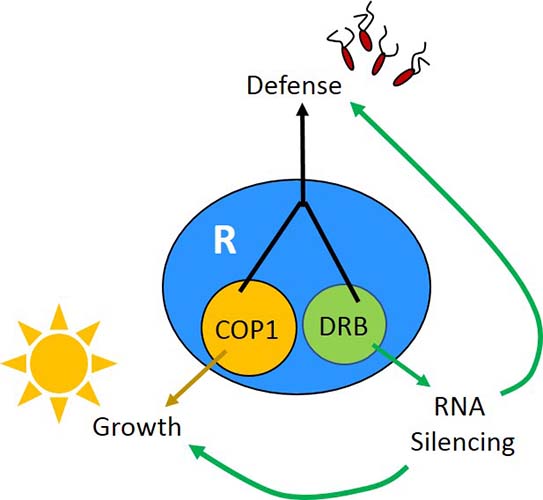UK researchers find connection between plant defense and development
UK researchers find connection between plant defense and development

Scientists in the University of Kentucky College of Agriculture, Food and Environment recently found that a cellular protein important for plant growth is also important for signaling defense against disease-causing microbes. This finding is important for scientists as they continue to better understand the trade-offs between pathogen defense and growth in plants.
“Traditionally, growth and defense have been studied separately, not just due to the complex nature of these physiologies, but also because many of the regulating components were considered exclusive to one or the other pathway. Our research ties these processes and the RNA silencing pathway together and shows that they regulate each other,” said Pradeep Kachroo.
Pradeep and Aardra Kachroo and lead author Gah-Hyun Lim and other UK plant pathology researchers, along with collaborators from Washington and France, found that the COP1 protein, a well-known repressor of photomorphogenesis (growth and development in response to light), also regulates pathogen defense. In the dark, COP1 helps recycle key proteins that stimulate light-dependent growth, thus helping conserve energy.
UK researchers found that COP1 recycles proteins involved in plants’ RNA-silencing machinery. The RNA-silencing proteins, in turn, regulate plant resistance proteins. Since COP1 and the RNA silencing proteins work together to help trigger resistance, if one of them is not present, then defense is not activated and plants succumb to disease.
“COP1 stops growth and lets resistance happen when there’s a need for defense. This is important because pathogen defense is an energy intensive process. Thus, COP1 acts kind of like a switch between growth and defense,” Aardra Kachroo said.
These findings will be important for scientists to design better strategies to combat agriculturally important microbial diseases with fewer repercussions to yield. The study was funded by the National Science Foundation’s Division Integrative Organismal Systems and recently published in PLOS Pathogens.
Research


